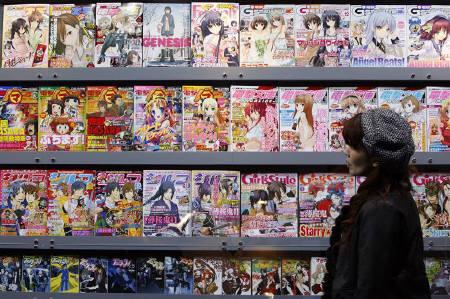TOKYO -- Two South Korean technology companies are borrowing from mobile gaming to shake up - and dominate - Japan’s storied manga industry, a plot twist that has expanded the comics’ fanbase to a new generation of readers.
Backed by tech giants Kakao Corp and Naver Corp, Piccoma and Line Manga have become Japan’s highest-grossing mobile apps outside games. Such online manga platforms have seen a surge in popularity during the COVID-19 pandemic.
Piccoma’s third-quarter transaction volumes more than tripled year on year to 11.6 billion yen ($110 million), extending a wave of online manga sales that has already seen digital surpass print in Japan’s $5 billion manga industry.
Line Manga, now operated by SoftBank’s internet business Z Holdings, saw transaction volumes jump by a third to 8.2 billion yen in the same period. Naver declined an interview request.
Piccoma passed Line Manga to become last year’s top-grossing manga app on both Apple’s IoS and Android. Its rise can be traced back to 2016, when it introduced a revenue model it calls “zero yen if you wait.”
The app’s manga tales - from classroom love stories to supernatural horror - are serialized. Users must wait for a timer to unlock the next instalment, or pay to read ahead.
Inspired by smartphone games in which playing is free but extra content is not, the approach marked a radical departure from the typical model of selling an entire manga volume up front at prices of $4-$6.
“We thought if we could grab 5% or 10% of the bigger games market it would drive growth,” said Yukiko Sugiyama, senior manager in Kakao Japan’s business strategy department.
Readers, eager to find out what happens next, often end up paying. The business model has become standard as dozens of book sellers, tech companies and publishers rushed to offer their own apps.
Paper trail
Megumi, a 34-year-old office worker in western Japan, said she reads 20 pages or so of manga on her phone during her lunch break, and turned to the two apps when stuck at home taking care of kids during last year’s pandemic state of emergency.
She became “addicted” to and paid for a hit Line Manga series, “True Beauty”, about a young woman whose makeup skills make her popular with men.
The strip originated in Korea, where the rise of the internet saw paper sales collapse, replaced by smartphone-optimised comics.
Manga apps offer a vast back catalogue of titles and exclusive strips.
“You can read manga carrying just your smartphone - it’s handy,” said Kana Misaki, a 36-year-old care worker living near Tokyo who reads manga “overwhelmingly” via apps.
In Japan, online manga is generally still formatted like a book, and traditional publishers are a powerful force, with editors closely involved in each stage of production.
Printed in black and white on cheap paper, paper manga remains affordable and disposable. The industry is protected under Japanese law from books being sold for less than their cover price, even online.
“For new titles, paper sales are much higher,” said Shu Hashimoto, an editor at publisher Kodansha’s long-running Weekly Shonen Magazine.
Even the most ardent app users say they will buy paper editions of their favourite titles.
“You don’t know when titles will disappear from the apps, so when I want them close at hand I buy them,” Misaki said.





















































